Black Swan
 for strong sexual content, disturbing violent images, language and some drug use.
for strong sexual content, disturbing violent images, language and some drug use.
Reviewed by: Jim O'Neill
CONTRIBUTOR
| Moral Rating: | Extremely Offensive |
| Moviemaking Quality: |
|
| Primary Audience: | Adults |
| Genre: | Psychological-Horror Thriller Drama |
| Length: | 1 hr. 43 min. |
| Year of Release: | 2010 |
| USA Release: |
December 3, 2010 (wide—19 theaters) December 22, 2010 (wider—1,400+ theaters) DVD: March 29, 2011 |
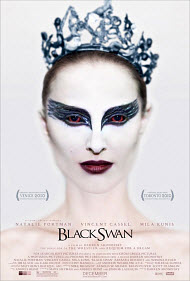

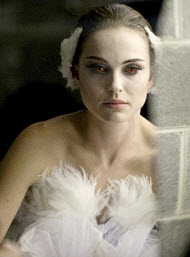
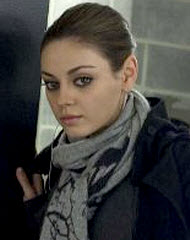
ON-SCREEN NUDITY—Why are humans supposed to wear clothes? Answer
EFFECTS OF CHILDHOOD SEXUAL ABUSE—self-loathing, self-harm, flashbacks, perfectionism, etc.
SELF-MUTILATION—Help for Cutters (and others who self-injure in some way)
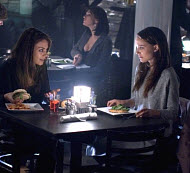
Lesbian fantasy sex
What about gays needs to change? Answer
It may not be what you think.
GAY—What’s wrong with being gay? Answer
Read stories about those who have struggled with homosexuality
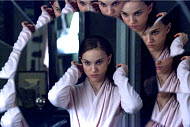
Dangers of living an unbalanced life
Dangers of perfectionism
Parents who are overly controlling or overly pressuring their children
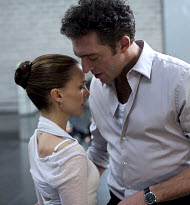
Sexual harrassment in the workplace
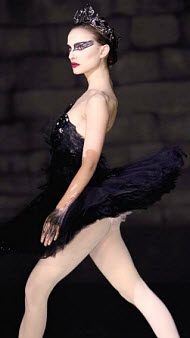
Pressures of getting older as a dancer
How to handle suicidal thoughts and impulses
SUICIDE—What does the Bible say? Answer
If a Christian commits suicide, will they go to Heaven? Answer
Dancing in the Bible
| Featuring |
|---|
|
Natalie Portman … Nina Mila Kunis … Lilly Winona Ryder … Beth MacIntyre Vincent Cassel … Thomas Leroy Barbara Hershey … Erica Toby Hemingway … Tom Sebastian Stan See all » |
| Director |
| Darren Aronofsky — “Noah” (2014), “Black Swan” (2010), “The Fountain” (2006) and “Requiem for a Dream” (2000), “The Wrestler (2008),” “Pi” (1998) |
| Producer |
|
Fox Searchlight Pictures Protozoa Pictures Phoenix Pictures See all » |
| Distributor |
 Fox Searchlight Pictures, a sister company of 20th Century Fox, a division of The Walt Disney Company |
from the director of “Mother!”, “Noah,” and “Requiem for a Dream”
Darren Aronofsky’s 2008 film, “The Wrestler” had the kind of grip a movie about wrestling ought to have. It packed a punch, because it was rooted in realism, a realism that sometimes went beyond real into the realm of the surreal. But the story of a wrestler, whose considerable talent and courage was not enough to save him from a life bent on self-destruction, kept a hold on its audience even up to and after its over-reaching finale. The story and the character, played magnificently by Mickey Rourke, had me too transfixed, too engrossed, and, yes, too resigned to the hero’s fate to let the disappointment over Rourke’s inevitable fall follow me out of the theater. I felt as invigorated as I felt saddened. The fighter’s effort was certainly worth the try.
I had no such feeling as I watched Aronofsky’s new film, “The Black Swan”. The movie has a remarkable ending. It’s not unlike the ending of “The Wrestler.” Both end with an arm spreading dive. The last scenes of “The Black Swan” comprise a visual tour de force whose dark depths and hyperkinetic spirals are almost a match for Tchaikovsky’s haunting score.
Unfortunately, the film falls apart long before the closing segment, and those final moments don’t generate quite enough steam to save the movie. Everything that precedes the ending is dense, claustrophobic, and weighed down by so much high minded cynicism and pretentious artifice that it never gets off the ground. That’s deadly for a movie about dancing which ought to be light on its feet.
Nina (Natalie Portman) is a member of the ballet corps of a fictional company that bears more than a passing resemblance to the New York City Ballet with its cutting edge artistry, hard driving competition, unquenchable thirst for funding, and titillating back stage drama. An aging ballerina named Beth (played in grandiose train wreck fashion by Winona Ryder) is a brilliant dancer. She’s temperamental and unpredictable. That’s okay. She has aged a bit. That’s not okay.
The dance company director, Thomas Leroy (played with Mephistophelean charm and cunning by French actor, Vincent Cassel), wants to do yet another production of “Swan Lake,” but this time he wants to strip it of its bloated sentimentality and strip it down to its bare essentials. Sure, he’s full of hot air, but Cassel makes him and the project he’s toting believable, even interesting.
He wants to cast a newer, younger Swan, one that he can mold and control—both on and off the stage. He sees something in Nina that every impresario in every back stage movie sees in his ingénue. “Kid, you’re going out there a chorus girl, but you’re coming back a star.” I apologize for lumping ballerinas with Broadway hoofers, but the hoofer’s mark is where “The Black Swan” lands, or drops itself, with more of a thud than a pointe.
Cassel trains Nina, but he also seduces her. The other dancers warn her that he’s a creep, but Nina disregards them, because Leroy “is a genius.”
For Nina, her impresario’s artistry and high IQ trump his selfishness and lagging moral compass. She’ll make a bargain with the devil to get the plum role that only he can place within her reach. She’s also a sad, fatherless child who seems to be in desperate need of a paternal figure.
Nina seems to have no friends inside or outside the corps. Another dancer, Lily (Mila Kunis), tries to befriend her, but only as a means of usurping her and stealing the part of the Swan. Lily does little to conceal her intent, but Nina nonetheless plays along. Lily takes her out for drinks the night before a performance, spikes Nina’s drink with a drug (Nina sees her do it), sets her up with two unseemly guys whom she has sex with, and attempts to seduce Nina herself.
Other than that, she’s a swell friend.
“A man who flatters his neighbor spreads a net for his feet.” —Proverbs 29:5 World English Bible
I found myself wondering if, indeed, Lily wouldn’t have actually been a much better Black Swan. Tchaikovsky’s evil bird has a sting to match its song; Nina has the song down, but she can’t find the sting. Lily has it in spades.
With the Nina-Lily relationship, Aronofsky has borrowed another ingénue story from the Hollywood files: the one about the ambitious unknown who waits in the wings and is ready to step on and over the star, in order to become the new star, a tale told best in the Joseph Mankiewicz’ 1950 film, “All About Eve.” “The Black Swan” does not hold up under the spotlight of that earlier classic.
In “All About Eve,” the aging theater star, Margo Channing (Bette Davis) and the relentlessly ambitious rising one, Eve Harrington (Ann Baxter) were equally matched in star power and star venom.
Nina, on the other hand, is overshadowed by everyone around her. She can’t find an opening anywhere. Several reviewers have called Aronofsky’s film a cross between “…Eve” and the 1948 British film, “The Red Shoes.” “…Swan” takes elements from both movies, but those elements don’t gel. I thought I was watching a camp parody of those classics. The more “…Swan” dragged on, the more I longed for the originals.
“The Red Shoes” is still the quintessential movie about ballet. It’s always a hard sell to get an audience to understand how a ballet dancer is able to give up everything: comfort, love, even life itself, for the sake of what appears to be an ethereal art, but the symbol of those seemingly innocent, inanimate scarlet slippers taking on a life of their own, and taking over the life of their owner puts the glory and the danger of that dream into clear perspective.
Victoria Page (Moira Shearer), the ballerina in “The Red Shoes”, lived and worked under the spell of an impresario, but she had her own life as well. She had fallen in love with a composer, and she had to decide between marriage and a career as a dancer.
Nina is a young woman who seems to have nothing to live for when the curtain comes down. Her home is a small Upper West Side apartment that she shares with her single mother, a failed ballerina who smothers her daughter with childlike affection and barely concealed hostility.
Barbara Hershey plays the mother, and she gives the best performance in the film. You can see in her face how pride and resentment go hand in hand, and how she disdains her own eye for talent, the eye that lets her see that her daughter has the talent that she had always craved for herself. Natalie Portman is getting all the kudos for her performance as Nina. She deserves them.
She gives a good performance, and she dances quite well, but Hershey is the real actress. I can’t put into words what makes a great performance, but I can point to Hershey’s here, and to those in several of her other films, and say that’s one.
Aronofsky has saddled his film with a lot of psychological (you could also say psycho) baggage. Nina’s dilemmas are harder to figure out than a Rubik’s cube, because you’re never quite sure if something is really happening or if that something is only an illusion that goes on inside Nina’s unbalanced head.
Nina has a life that exists between two points: the rehearsal room balance bar and her pink and white bedroom that is full of stuffed animals. Who wouldn’t be neurotic going back and forth between those two extremes, on the New York City subway, no less. She imagines a lot of things, and it gets harder and harder to distinguish between the real and the imagined.
The plot is not rooted in anything that can grab you or make you feel for Nina, the way you could feel for Mickey Rourke’s desperate, but very real, character in “The Wrestler.”
Nina’s transformation from baby doll to temptress coincides with her move from the real world to a fantasy one. After awhile it’s hard to distinguish one world form the other, and, ultimately, it’s hard to feel anything for her.
Does Nina really dance the black swan? Does she kill her rival? Does she wound herself when she goes on a rampage in her dressing room? Does the prince really drop her at the end of the first act? Whose fault was THAT? And what’s the fallout? No heads rolling?
I guess not, but at this point my own head is rolling, and reeling. I wonder if I’m going crazy. too. And that, I believe, is what Aranofsky has in mind. He doesn’t want to just take us inside his characters’ heads, he wants us to live inside that head, too—feel the pain, do the drug, take the dive.
No thanks.
The film’s nudity is fairly heavy, and there are scenes of masturbation and sex between women—badly photographed and badly edited. There is more sex and sexual talk.
The language is often coarse.
There are, also, scenes of physical mutilation and blood letting. Bleeding extremities are no shock in a movie about dancing, but Nina suffers from an ugly rash that keeps popping up under her scapula. She may or may not be scratching it—maybe that too is all in her mind.
But enough of the “maybe it’s real, maybe it’s not” stuff. The movie is one big rash, one that is best left alone.
- Sex/Nudity: Very Heavy to Extreme— • prolonged lesbian sex scene (Portman and Kunis) • 2 female masturbation scenes (Portman) • vulgar sexual conversations • Portman stripped naked to panties • Portman wears just a towel • male gropes Portman • female gropes Portman • female gropes male dancer • partially undressed female dancers • etc.
- Profanity and Vulgarity: Very Heavy— • 15+ f-words (including “You f*cking little wh*re,” “F*ck you,” “Would you f*ck that girl?”, “I f*cked them both”) • “Did you suck his c*ck?” • “Did you have some sort of lezzy wet dream about me?” • crude words for male and female genitals • “lick your p*ssy” • “J*sus Chr*st” (1) • J*sus” (2) • “Oh my G*d” (2) • s-words (2—including “Holy sh*t”) • *ss (2—including “a**-kissing) • many vulgar sexual coments, innuendos and actions
- Violence: Heavy
See list of Relevant Issues—questions-and-answers.


Moral rating: Average / Moviemaking quality: 5
Moral rating: Offensive / Moviemaking quality: 5
Moral rating: Very Offensive / Moviemaking quality: 5
Moral rating: Average / Moviemaking quality: 5
Plus, Mila Kunis and Vincent Cassell compliment Ms. Portman’s performance by delivering top-notch characterizations that will leave you floored… literally. Barbara Hershey and Winona Ryder also shine in supporting roles. The ballet sequences are also very well done. Biblically speaking, there is plenty of profanity (though, thankfully, it never reaches the level of the 1983 “Scarface”), some intense scenes that might make you squeamish and some sexual content. But if you’ve seen the 1983 “Scarface,” you can certainly handle this movie, as that film is the epitome of the R rating. But I digress.
In spite of the objectionable content in “Black Swan,” I recommend it. But be warned: it’s NOT for the squeamish and easily frightened.
Moral rating: Very Offensive / Moviemaking quality: 5
Now, God can and will forgive a repentant sinner like Nina (and worse), even when death is minutes away (one of the thieves next to Christ is a good example); yet Nina apparently dies thinking that she was perfect with her “Swan Lake” performance. If that is not bad enough, Nina had these hallucinations throughout the movie, and you could not tell what was real and what was a stoned trip. I could go on and on about this movie, but I have said my fair share.
We need the good old Hays Code back. Pray that God lightens Hollywood to bring it back. Hollywood needs God. Pray for them.
Moral rating: Extremely Offensive / Moviemaking quality: 4
The lesbian sexual scenes had NOTHING to do with the plot. This is not an art movie; it is porn and the actresses should be ashamed, because real acting should never involve sex scenes. Everyone has a job in real life, but most people don’t perform lesbian lovemaking for millions of people to view. Sick, Sick, Sick.
Moral rating: Extremely Offensive / Moviemaking quality: ½
Moral rating: Extremely Offensive / Moviemaking quality: 1½
Let me list the positives first: The story itself was quite gripping. There were many times throughout the film where I could really sense Nina’s distress, desperation, and mental fragility. Natalie Portman was astounding in the role. Not only did she engage my emotions, but I was stunned by her as a dancer. I could really tell that she put heart and soul into the role of Nina Sayers. My favorite parts of the film were all on-stage during rehearsals and the final performance. As a writer and lover of the fine arts, I really did appreciate the work that the actors put into the film. There were definite moments of loveliness, but not enough to convince me to see the film again.
Negatives: Unfortunately, this film was littered with strong, sexual themes. I was prepared for some of it, but I went into the theater completely unaware that there would be a lesbian sex scene. My friend and I were both surprised. The previews had shown a kiss between Portman and actress Kunis, but we weren’t expecting anything so graphic to follow. Aside from homosexuality, there were scenes of masturbation, and sensual moments between Nina and her employer. It’s almost as if the arts cannot exist without sexuality. There was foul language, violence and disturbing images.
So if you’re a parent, I would definitely keep your young teens away from this one. As a Christian, I know that I will always have run-ins with the darkness of this world. There really is no escaping it. But I always try to monitor how much “darkness” I allow into my soul at one time. Now, I can appreciate this film for its artistry… but even if I weren’t a Christian, I feel that the core of the story was strong enough to survive without its excessive depravity. So, if you wish to see it, are old enough to see it, and are strong enough to view graphic images and heavy sexuality, the story itself is interesting enough to go see on the big screen. Just be forewarned. I do believe that Natalie Portman deserves the Oscar for this one.
Moral rating: Extremely Offensive / Moviemaking quality: 4
I advise against seeing this movie based on the dark themes and disturbing material that is promoted as “ART.” Well it is NOT art. It is another attempt to twist the bad and make it seem “normal” and “good.” It is very hard in the world we live in to keep “fighting the good fight” and “stand firm,” but after seeing this movie it has made me more aware of how much of a “fight” it actually is against the depraved minds of Hollywood producers and film stars willing to seduce the world into the perils of evil. All we can do is pray for them that they will see the error of their ways and how Satan has them wrapped around his little finger.
Moral rating: Extremely Offensive / Moviemaking quality: 4
Moral rating: Extremely Offensive / Moviemaking quality: 2
Moral rating: Extremely Offensive / Moviemaking quality: 3
“Black Swan” strikes me like that. It has faux docu-drama hand held video effect in the walking scenes. I think some creative guy or gal said, “Every little girl knows ‘Swan Lake’ so let’s cross one of those mind-numbingly boring PBS backstage at the ballet ‘inside baseball’ documentaries with some utterly immature Prima Ballerina who thinks that she has to live the part of the White and Black Swans, and so she disintegrates in front of the audience.”
Then after they shot it, they showed it to some test audiences and the men still thought it was mind-numbingly boring, so some creative guy or gal said, “Let’s put some sex into it, and we’ll excuse it all with some Ecstasy.” Then someone else said, “Kunis is hot. We get some girl-on-girl action, and then we will get the male demographic. Oh! and we will tell her to masturbate, but she will think her Mom might be looking on.” Please!
If this is what passes for creativity, then my dog should be on the script committee. The film is an insult to any sane person’s intelligence. That is it. It is a boring ballet flick, spiced up with emotional disintegration of a Prima Ballerina through maternal pressure and E and with Mila Kunis playing her disgustingly hedonistic foil. It is unChristian. It is stupid—because no one so crazy would be entrusted with the fate of a major production. I like ballet, yet if ballerinas only knew how little we all care about their obsession, they would realize where “Black Swan” belongs—in the black comedy section. The Wayan Bros. “Dance Flick” has more claim to an Oscar.
But the Left Liberals of the Hollywood community will pour acid on “The Tourist,” yet elevate this bunkum to deep status. If this is their deepest thoughts, one could walk through them and not get your feet wet. If you are mildly paranoid about Hollywood anti-Christian bias, then you might think that this is Hollywood’s view of Christians—highly repressed, unhappy people with obsessive compulsive behavior,who cut themselves because they are not permitted to masturbate. I do not quite think it is that, but they are probably born with Havelock Ellis in their mothers’ milk, so perhaps it is an unconscious influence.
It would be different if Portman’s character were a virgin or a Christian, but she does not seem to be either to me. Accordingly, it is just very offensive. Do not let anyone who has mental health issues or your adolescent daughters see this film. It is a ticket to anorexia and bulimia. But, otherwise, just laugh at what happens to people who want to be deep when they lose their faith.
As St. Paul said, “When I was a child, I used to talk as a child, think as a child, reason as a child; when I became a man, I put aside childish things.” That message has yet to reach the really “deep” people in Hollywood.
This is a stupid, offensive picture, that does not deserve your patronage, and it is hard to laugh in it, because so much of the audience treat it seriously, but I did and got some stares.
Moral rating: Very Offensive / Moviemaking quality: 2
Moral rating: Extremely Offensive / Moviemaking quality: 3
Moral rating: Extremely Offensive / Moviemaking quality: 3½
It was not difficult to tell what parts were “real” and what parts were Nina dissociating or falling into depersonalization (as primitive psychological defense mechanism.) Example: any time you saw someone else but then it turned to Nina, it was Nina to begin with. With the mirror fight scene (during a break in the performance) she was fighting herself. She was not a fully integrated person. People are not good or bad. Whenever this dualism is portrayed, it’s not realistic. Nina just denied anything negative (or that she thought was negative) about herself and fell into all sorts of unhealthy stuff. The tired old Madonna/Whore Complex was alive and well in this movie. Enough already. The lesbian scenes showed that 3 guys wrote the screenplay and this was only for sensationalistic junk. The clubbing scene, drinking and getting high was not unrealistic, even for religious students who go off to college with a poor sense of self and then act out in idiotic ways.
Portman’s acting was excellent—too bad the screenplay was so simplistic and, well, just no good. I agree with someone who said to go see “The King’s Speech.” Now that’s a really great movie. I wouldn’t spend my money on this movie again, that’s for sure. I wouldn’t be afraid of the movie either, though. Again, nothing supernatural or scary. It’s Nina’s junk.
Moral rating: Offensive / Moviemaking quality: 4½
Moral rating: Extremely Offensive / Moviemaking quality: 3
Moral rating: Extremely Offensive / Moviemaking quality: 4
As an artist (an actress, not a dancer) it caused me to contemplate how far I would go for my art. Would I sacrifice my own sanity for perfection? The ending of this film chilled me to the bone. I was deeply affected and terrified by it.
Nina’s last words of “I was perfect,” as she is enveloped by her character, even to the death, captured the film’s intent completely.
“Black Swan” must be viewed with interpretative eyes to be fully appreciated. Don’t watch the film and be shocked by its horror, go and appreciate it for the art that it is, for it is truly ART. The use of mirrors and the effect of Nina seeing herself as other people practically screams the theme of the film: you are your own worst enemy. The color scheme, the audio, the casting—all fantastic. The violence and bloody scenes are all rather brief, but if you are easily troubled by such things, it could be a bit much. I only recommend “Black Swan” to avid fans of the art of film. It may be too raw and disturbing for the average moviegoer.
Moral rating: Extremely Offensive / Moviemaking quality: 5
I believe there are actually some who will justify their seeing a movie known to be filled with immorality all in the name of viewing an “artistic” piece of work. In short, each person should ask if Christ would approve of the movie before recommending it to others.
My only quibble with the film has to be the completely unnecessary, gratuitious lesbian scene in the middle of the film. I’m the biggest liberal that there is, and even I was taken aback by this scene. I’ve seen the film twice now, and I still can’t place the significance of that one scene. Other than that, the film is perfect. It’s still an extremely sexual film, however, and those who are easily offended should stay home. Only serious film buffs need apply. Highly, highly recommended—with one tiny reservation. …
My Ratings: Moral rating: Extremely Offensive / Moviemaking quality: 5